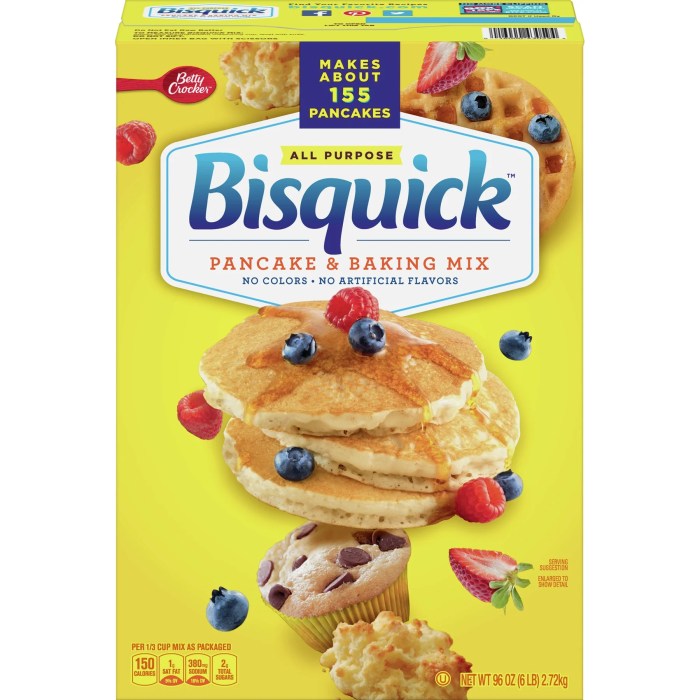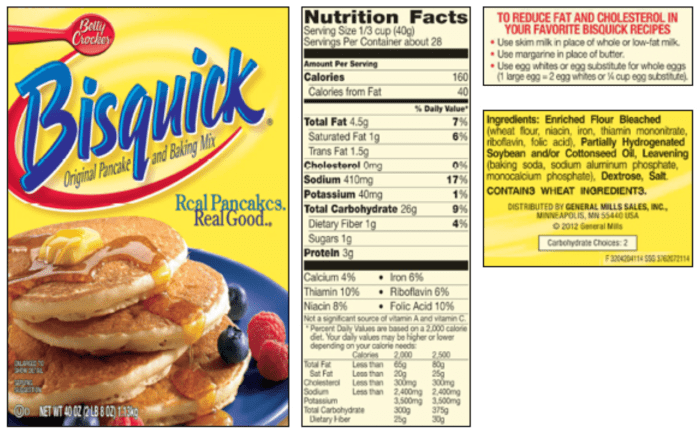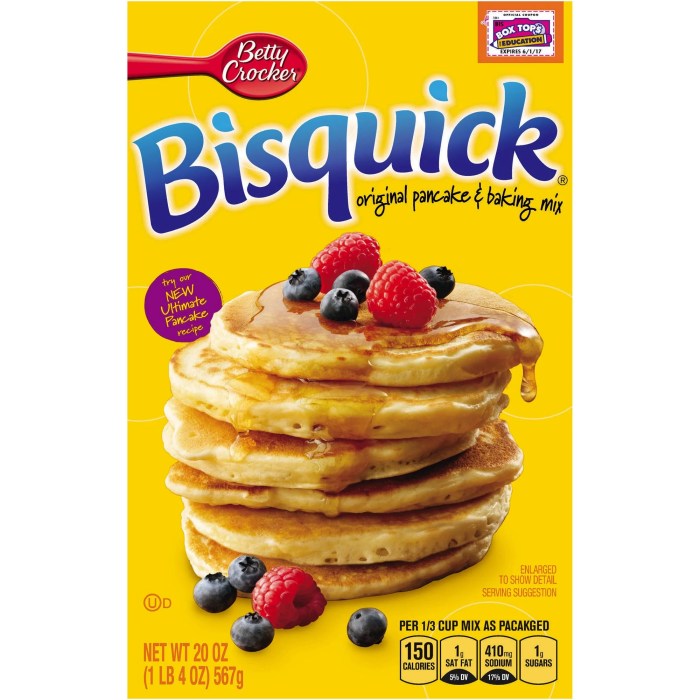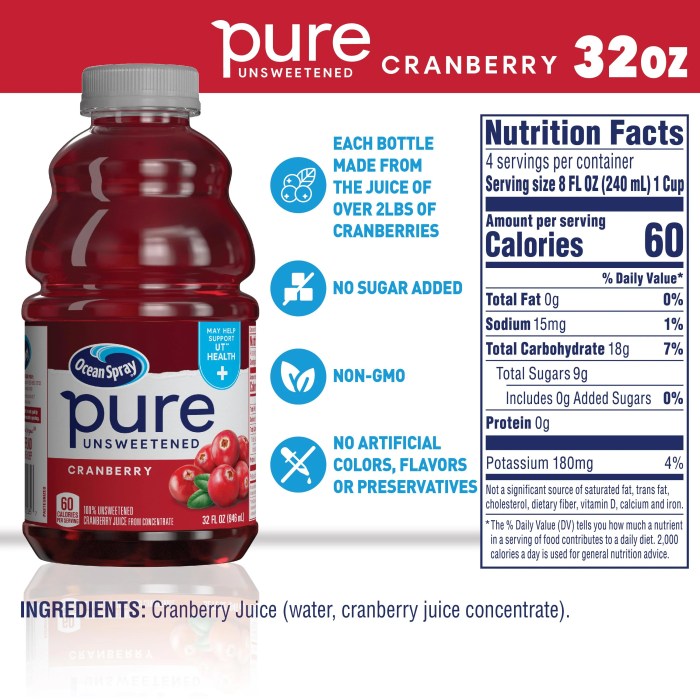Bisquick Pancake Ingredients & Nutritional Breakdown

Bisquick pancake nutrition facts – Bisquick pancake mix provides a convenient base for preparing pancakes, but understanding its ingredients and nutritional profile is crucial for informed dietary choices. This section details the composition of Bisquick and compares its nutritional values to other popular pancake mixes, considering the impact of added ingredients like milk, eggs, and butter.
Bisquick Pancake Mix Ingredients
The precise ingredient list may vary slightly depending on the specific Bisquick product and regional variations. However, a typical Bisquick pancake mix generally contains bleached enriched flour, baking powder, sugar, salt, and partially hydrogenated soybean oil. Some formulations may also include leavening agents such as monocalcium phosphate and sodium bicarbonate. It is important to always refer to the packaging for the most up-to-date and accurate ingredient list.
Nutritional Content per Serving of Bisquick Pancakes, Bisquick pancake nutrition facts
The nutritional information provided below is an approximation and may vary slightly depending on the serving size and the addition of other ingredients. It is essential to consult the nutritional label on the Bisquick packaging for the most accurate information.
| Nutrient | Amount per Serving | % Daily Value | Notes |
|---|---|---|---|
| Calories | 150-200 (approximately) | 7-10% (approximately) | Variability depends on serving size and added ingredients. |
| Total Fat | 5-8g (approximately) | 7-12% (approximately) | Primarily from added oil. |
| Saturated Fat | 1-2g (approximately) | 5-10% (approximately) | Contribution from partially hydrogenated oil. |
| Cholesterol | 0mg | 0% | Naturally cholesterol-free. |
| Sodium | 200-300mg (approximately) | 8-12% (approximately) | Significant portion comes from added salt. |
| Total Carbohydrate | 25-35g (approximately) | 9-12% (approximately) | Primarily from flour and sugar. |
| Dietary Fiber | 1-2g (approximately) | 4-8% (approximately) | Relatively low fiber content. |
| Total Sugars | 4-6g (approximately) | N/A | Includes added sugar. |
| Protein | 3-4g (approximately) | 6-8% (approximately) | Relatively low protein content. |
Comparison to Other Pancake Mixes
The nutritional content of Bisquick pancakes varies compared to other popular pancake mixes. Some mixes may contain less fat or sugar, while others might offer higher protein or fiber content. For example, mixes using whole wheat flour instead of bleached enriched flour will generally have higher fiber content. Direct comparison requires reviewing the nutritional information provided on each specific product’s packaging.
This comparison should be made on a per-serving basis, accounting for differences in serving size.
Impact of Added Ingredients on Nutritional Profile
Adding milk, eggs, and butter significantly alters the nutritional profile of Bisquick pancakes. Milk and eggs increase the protein content and add some fat and cholesterol. Butter substantially increases the fat content, particularly saturated fat, and raises the calorie count. These additions should be considered when assessing the overall nutritional impact of the final product. For example, using a milk alternative like almond milk can reduce the fat and calorie content, while adding fruit can increase fiber and micronutrient intake.
Bisquick pancakes, a breakfast staple, often leave one wondering about their nutritional value. A quick comparison with other options reveals interesting contrasts; for instance, considering the fiber and vitamin content of squash nutrition facts 100g highlights the significant differences in a balanced diet. Returning to Bisquick, understanding its fat and carbohydrate content is crucial for making informed dietary choices.
Micronutrient Content and Dietary Fiber

Bisquick pancakes, while convenient and palatable, offer a nutritional profile that warrants careful consideration. Understanding the micronutrient content and the role of dietary fiber is crucial for assessing their place within a balanced diet. This section will detail the key micronutrients present, analyze the impact of fiber on digestion, and compare the nutritional composition to that of whole-wheat pancakes.
The micronutrient content of Bisquick pancakes is relatively modest compared to many whole-grain alternatives. While they provide some essential vitamins and minerals, their levels are often lower than those found in foods considered nutritionally dense.
Key Micronutrients in Bisquick Pancakes
The following list details the key micronutrients present in a typical serving of Bisquick pancakes, bearing in mind that exact amounts may vary slightly depending on the specific recipe and ingredients used. It is important to consult the most current nutritional information on the product packaging for the most accurate data.
- Iron: Bisquick pancakes provide a small amount of iron, a crucial mineral for oxygen transport in the blood. However, this contribution is generally considered minimal compared to iron-rich foods such as red meat or legumes.
- B Vitamins: Small amounts of various B vitamins, such as thiamin, riboflavin, and niacin, are present. These vitamins play vital roles in energy metabolism and neurological function. However, the quantities are unlikely to significantly impact overall daily intake.
- Calcium: Bisquick pancakes contain a small amount of calcium, essential for bone health. Again, this contribution is usually modest compared to calcium-rich foods like dairy products.
Dietary Fiber in Bisquick Pancakes and its Impact on Digestion
The dietary fiber content of Bisquick pancakes is generally low. This is largely due to the use of refined flour in the mix, which lacks the bran and germ components found in whole grains. Low fiber intake can lead to infrequent bowel movements and constipation. Adequate fiber intake promotes regular bowel movements and contributes to a healthy gut microbiome.
Benefits and Drawbacks of Micronutrient and Fiber Content
The low micronutrient and fiber content of Bisquick pancakes presents both benefits and drawbacks. The benefit lies in their convenience and ease of preparation. However, relying heavily on these pancakes as a primary food source can lead to deficiencies in essential vitamins, minerals, and fiber, potentially impacting overall health and well-being. A balanced diet incorporating a variety of nutrient-rich foods is crucial to mitigate these potential drawbacks.
Comparison of Micronutrient Content to Whole-Wheat Pancakes
Whole-wheat pancakes, made with whole-wheat flour, significantly outperform Bisquick pancakes in terms of micronutrient and fiber content. Whole-wheat flour retains the bran and germ, which are rich sources of dietary fiber, vitamins, minerals, and antioxidants. This results in a substantially higher concentration of nutrients, including iron, B vitamins, and various other micronutrients, compared to the refined flour used in Bisquick mixes.
The increased fiber content in whole-wheat pancakes also contributes to improved digestive health and satiety.
Potential Health Impacts and Dietary Considerations: Bisquick Pancake Nutrition Facts

Regular consumption of Bisquick pancakes, like many processed foods, presents potential health implications due to their high carbohydrate content, added sugars, and often, high fat content depending on the recipe variations. Understanding these impacts and making informed dietary choices is crucial for maintaining overall well-being. This section will explore the potential health effects and offer guidance for individuals with specific health concerns, along with suggestions for improving the nutritional profile of Bisquick pancakes.Bisquick pancakes, when prepared according to package directions, are a significant source of carbohydrates, providing a quick energy boost.
However, the reliance on refined flour contributes to a rapid spike in blood glucose levels, potentially problematic for individuals managing diabetes. The added sugar further exacerbates this effect, contributing to increased insulin resistance and potentially leading to long-term health complications. Furthermore, the fat content, largely dependent on added ingredients like butter or oil, can contribute to elevated cholesterol levels if consumed regularly in large quantities.
These factors, coupled with often low fiber content, contribute to a less-than-ideal nutritional profile.
Health Impacts of Regular Bisquick Pancake Consumption
Frequent consumption of Bisquick pancakes, especially in large portions and without mindful modifications, can negatively impact several aspects of health. The high glycemic index (GI) can lead to fluctuations in blood sugar levels, potentially contributing to insulin resistance and increased risk of type 2 diabetes. High intakes of saturated and trans fats, if present in the recipe, can elevate LDL (“bad”) cholesterol levels, increasing the risk of cardiovascular disease.
The lack of significant fiber may also contribute to digestive issues and a feeling of less satiety, leading to overconsumption of calories. While occasional consumption is unlikely to cause significant harm for most healthy individuals, regular and excessive intake should be approached with caution.
Dietary Considerations for Specific Health Conditions
Individuals with diabetes must carefully monitor their carbohydrate intake and blood sugar levels after consuming Bisquick pancakes. Smaller portions, the substitution of whole-wheat flour for a portion of the all-purpose flour, and the reduction or elimination of added sugars are crucial modifications. Those with heart disease should limit the amount of saturated and trans fats added to the recipe, opting for healthier alternatives like unsaturated fats from olive oil or avocado.
Individuals with gluten allergies or celiac disease must avoid Bisquick pancakes entirely, as they contain wheat flour. Allergies to other ingredients, such as eggs or milk, should also be considered and alternative recipes sought.
Modifying Bisquick Pancake Recipes for Improved Nutritional Value
Several simple modifications can significantly enhance the nutritional profile of Bisquick pancakes. Incorporating whole-wheat flour, oat flour, or even almond flour can increase the fiber content and reduce the glycemic index. Adding fruits such as berries, bananas, or applesauce provides additional vitamins, minerals, and fiber. Substituting unsweetened applesauce for some of the sugar reduces the overall sugar content while adding moisture.
Using low-fat or fat-free milk and incorporating ingredients like flaxseed meal or chia seeds can further enhance the nutritional value.
Healthier Alternatives and Additions to Bisquick Pancakes
To improve the nutritional value of Bisquick pancakes, consider the following additions:
- Whole-wheat flour: Increases fiber and reduces glycemic index.
- Oat flour: Adds fiber and a slightly nutty flavor.
- Berries: Provide antioxidants and fiber.
- Banana: Adds potassium and natural sweetness.
- Nuts and seeds (e.g., walnuts, flax seeds): Offer healthy fats, fiber, and protein.
- Unsweetened applesauce: Reduces sugar content and adds moisture.
- Greek yogurt: Adds protein and calcium.
Popular Questions
Are Bisquick pancakes a good source of protein?
Bisquick pancakes offer a moderate amount of protein per serving, but the exact amount depends on the recipe and added ingredients like eggs and milk. Adding protein-rich toppings can further boost the protein content.
Are Bisquick pancakes gluten-free?
No, traditional Bisquick pancake mix contains wheat flour and is therefore not gluten-free. However, there are gluten-free alternatives available on the market.
Can I make Bisquick pancakes healthier?
Yes! You can enhance the nutritional profile by using whole wheat flour, adding fruits and vegetables, reducing the amount of added sugar, and using less butter or oil in the cooking process.
How many Bisquick pancakes constitute a serving?
A standard serving size is typically 2-3 small pancakes, but this can vary depending on the recipe and pan size. Always refer to the nutritional information on the packaging for the most accurate serving size.








